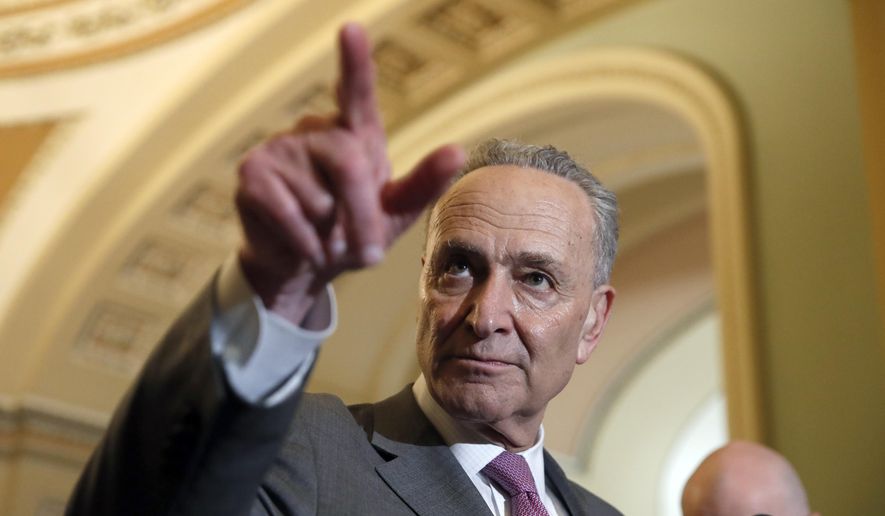Senate Democrats inserted themselves Monday into President Trump’s negotiations with North Korea, handing him a list of conditions for a denuclearization deal and cautioning him not to get snookered by North Korean leader Kim Jong-un.
Demanding a role in the deal making, Senate Minority Leader Charles E. Schumer and top congressional Democrats said they feared Mr. Trump would cave in at the June 12 summit with Mr. Kim in Singapore in his eagerness to strike a deal.
Among the demands: a “permanent” dismantling and removal of every North Korean weapon of mass destruction; the destruction of the North’s entire nuclear weapons infrastructure; the end of Pyongyang’s ballistic missile programs as well; and regular and complete briefings of Congress on the progress of the talks.
“If he tries to reach a deal with Kim Jong-un just for the sake of reaching a deal and the agreement fails to live up to the principles we’ve laid out, then he’ll have been bested at the negotiating table yet again,” said Mr. Schumer, whose letter did not detail what the U.S. could offer Mr. Kim in an effort to strike a deal.
He added, “The president needs to be able to walk away from the table if there isn’t a good deal to be had.”
Democrats staunchly opposed Mr. Trump’s confrontational moves against North Korea in the first months of his administration, saying his tough rhetoric was tempting nuclear war. Now, with a stunning and unexpected diplomatic breakthrough perhaps in the offing, many of those same Democrats warn that his agreeing to a face-to-face meeting was empowering Mr. Kim.
The concerns they raise now echo Mr. Trump’s criticism of the 2015 Iran nuclear deal struck by President Obama, which Mr. Trump called “the worst deal ever.”
Mr. Trump was able to withdraw the U.S. from the Iran nuclear deal because Mr. Obama did not present it to the Senate for ratification knowing that the GOP-run chamber would have rejected it.
This time, Secretary of State Mike Pompeo has said the administration is considering putting the deal in front of the Senate as a treaty for ratification.
Mr. Schumer insisted there were no similarities between the Iran nuclear deal and concerns about Mr. Trump’s bargaining in Singapore.
“Iran did not have nuclear weapons or a functional ICBM. North Korea has both,” the New York Democrat told reporters. “So the danger to the United States is so much the greater here. The danger to the Pacific region is so much the greater. And that’s why having a really strong, permanent settlement here in North Korea, or agreement, is so, so important.”
The Democrats’ list of five demands arrived as the bargaining stance of Mr. Trump and Mr. Kim came into focus.
A shake-up of senior North Korean military leaders revealed over the weekend has potentially paved the way for a denuclearization deal and an opening of the reclusive communist regime with an eye toward economic development.
The three military leaders were replaced with younger and reportedly more moderate figures loyal to Mr. Kim. It could allow the young North Korean leader and the ruling party to tighten control over the national army if concessions are made to the U.S. in the course of the upcoming talks.
Defense Secretary James N. Mattis told reporters Monday that the negotiations still face a “bumpy road” until Pyongyang takes clear and irreversible steps to dismantle its nuclear arsenal.
He also there would not be a drawdown of U.S. troops that have been stationed in South Korea for decades, a likely demand by Mr. Kim.
“We’re not going anywhere. It’s not even a subject of the discussions,” Mr. Mattis said as he headed back to the U.S. after attending last week’s Shangri-La dialogue of allied defense ministers in Singapore.
Roughly 28,000 U.S. service members have been stationed on the Korean peninsula in support South Korean forces since the Korean War, a war that was never formally ended after the armistice was singed in 1953.
A peace agreement to end the Korean War will be on the table in Singapore.
Reports surfaced last month that the Trump administration requested options from the Pentagon on a possible drawdown or full withdrawal of American troops on the peninsula.
At the time, Mr. Trump and National Security Adviser John R. Bolton vehemently denied it. However, Mr. Trump has expressed concern in the past over the operations and maintenance costs tied to the decades-long deployment of American forces in South Korea.
The Senate Democrats’ letter did not address U.S. troops in South Korea.
Their demands include several items that were missing in the Iran nuclear deal, such as providing complete access for inspectors and making the deal permanent.
“Getting an agreement with North Korea is actually the easy part. In fact, the Clinton, Bush and Obama administrations were able to reach agreements with North Korea,” said Sen. Robert Menendez, the top Democrat on the Senate Foreign Relations Committee and a signer of the letter. “But getting a good agreement that works and is sustainable, something that is not just a flimsy framework and that leads to real progress on denuclearization, is the hard part.”
• S.A. Miller can be reached at smiller@washingtontimes.com.
• Carlo Muñoz can be reached at cmunoz@washingtontimes.com.




Please read our comment policy before commenting.